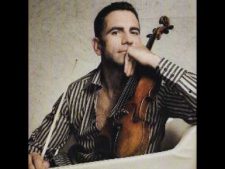Sunday, March 10, 1996
- 1995-1996 Season
- Symphony Orchestra
- Conductor: Jed Gaylin
- Works Performed:
- Romeo and Juliet Overture - Fantasy by Pyotr Ilyich Tchaikovsky
- Fortuna Desperata by Albert Leman
- Concerto for Violin in D Major, Op. 61 by Ludwig van Beethoven
- Featured Artists: Peter Sirotin Timothy Schwarz
- Venue: Shriver Hall
- Time: 3:00 pm
Concert Details

Program Notes
Fortuna Desperata
Albert Leman
When I was in Moscow during the Winter of 1992, one of the outstanding musicians I met was Albert Leman. Albert Simeonovich is Chair of the Composition Department at the Moscow State Conservatory and a prolific composer. His works are widely published and performed in Russia. The piece we will perform tonight had its premiere in Tadzikistan; I conducted the Moscow premiere with the Gnessin Institute Orchestra, and tonight will be the American premiere.
I would like to be able to say that Albert Simeonovich and I had long conversations about his music and his musical philosophy. Unfortunately, times was short and when we did speak (in broken Russian on my part) it was usually about matters germane to the performance at hand. The title of the work refers to a Mass by Renaissance composer Josquin De Prez (1440-1521). Josquin had set this to a familiar tune of the ime, possibly by Busnois originally. In Leman’s “Fortuna Desperata” there is only loose connection to the contours of the original.
What is certain however, is the sentiment of “desolate fate.” The piece, scored for Strings and Timpani, is dedicated to the memory of Albert Simeonovich’s wife, Elena Alexandrovna Abrosimova. The piece begins softly, as an elegy, and quite tonally. After this choral-style opening, searing emotion erupts and builds with the timpani entrance to a shattering climax.
The sound suddenly impodes to a timpani solo which is then succeeded by an eerie solo violin. These two solo instruments form a kind of polarity of sound and emotion; the violin is otherworldly and always very high in range while the timpani rumbles with a hollow desolate quality.
After this interlude, there is a recapitulation or restatement of the opening chorale. The theme has an even more haunting feel since strings are now muted. From this point in the piece, fragments of the chorale are intercut with sighing figures, and hollow pizzicato (plucked) notes. After one final climax, this time lyrical, the violin solo soars from its lowest point to the stratosphere. At this point it mysteriously evaporates to leave, as a vestige of its presence, a shimmering chord in the rest of the orchestra.
Of the pieces of Albert Leman’s with which I became acquainted while in Moscow, this one spoke the most immediately to me. We share it with you now in with the hope that it will also speak as compellingly to you.
—Jed Gaylin
